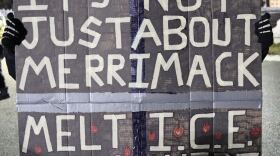Dartmouth faculty narrowly voted to censure President Sian Beilock on Monday – a first in the college’s more than 250-year history – for her decision to call state and local police on people protesting Israel’s War in Gaza on May 1.
The censure passed 183 to 163. It does not call for the president’s resignation, but formally condemns her actions and calls for less punitive responses to student protests.
It’s not clear that the vote will result in any changes within the Dartmouth administration.
Liz Lempres, chair of Dartmouth’s board, said “the board unequivocally and unanimously supports President Beilock.” A university spokesperson said the vote “reflects the deeply divided feelings across the nation and around the world about the Israel-Hamas war,” the police response to campus protests and other issues.
"Input from a community as devoted as ours is invaluable and serves to strengthen connection and understanding,” the spokesperson said. “We are focused on supporting one another, on continuing to make space for dialogue across difference, and on moving forward together.”
Christopher MacEvitt, a religion professor and one of two faculty members arrested during the May 1 campus protest, said faculty are concerned about Beilock’s behavior beyond just that day.
“The faculty really see a pattern in which the president is very willing to call the police to campus,” he said, noting the arrest of two pro-Palestinian students in October.
MacEvitt said many faculty and students have urged the president to drop the charges against protestors, but they have not received a clear response from the administration. The vast majority of the 89 people arrested on May 1 were students. While the college has worked with prosecutors to drop charges against two student journalists swept up by police, they haven’t done the same for anyone else. Their arraignments are scheduled for this summer.
Per conditions of their bail, those arrested are barred from Dartmouth’s Green, the center of campus life. With commencement a few weeks away, MacEvitt said there is no clarity from the president’s office on how arrested students and faculty will be able to participate in the ceremony, which traditionally occurs in the same space.
Matt Garcia, a professor of history and Latin American studies who helped draft the motion, said faculty met with Beilock in the weeks prior to the vote about canceling the charges and restrictions on campus, but her response was “obstinate and stubborn.”
“We really had no other option than to make the motion of censure,” Garcia said.
Garcia said faculty considered holding a no-confidence vote, which would call for Beilock’s resignation,
but they ultimately decided on a censure because it was “a lower bar for everybody to embrace.”
MacEvitt introduced the motion to faculty and the other arrested faculty member, Annelise Orleck, seconded it. Orleck, a 65-year-old professor of American history, was thrown to the ground by New Hampshire State Police during her arrest a few weeks ago. She said has felt disconnected from campus, a place she has worked at for 34 years, in the weeks since, but she feels like she and other allies “reclaimed” campus after the censure vote.
Orleck said Dartmouth’s faculty resolution built on the momentum of similar measures last week, including Columbia’s no confidence vote in their university president and Dartmouth students’ no confidence vote in Beilock. She said these actions are “[responses] to the criminalization of dissent” and rebuke of a “violent wave of suppression on campus free speech.”
Orleck said she hopes the censure makes the college take action.
“I hope that this will move Dartmouth to press for the prosecutors to dismiss these absurd charges,” she said.
Still, many faculty spoke in support of the president. Dan Rockmore, a professor of mathematics and computer science, voted against the censure because he thought Beilock acted appropriately during the protests earlier this month.
“I can definitely understand why you would call in law enforcement if you were concerned that there was going to be a large demonstration in a public place,” he said, adding that gun ownership rates are high in the surrounding community.
Alumni responses have been equally divided. Some alumni groups, including the Dartmouth Alumni for Palestine, Dartmouth Association of Latino Alumni, the Dartmouth Asian Pacific American Alumni Association and a group of Jewish alumni, criticized Beilock’s actions.
Others praised her response, saying she “prevented the situation from devolving into a venue for hate, violence, and antisemitism, as we have seen at peer institutions.” Linda Cronin, a 1984 graduate of the college, started an online petition in support of Beilock that has amassed over 4,000 signatures since May 6.
“The success of the petition indicates that a lot of people agreed with us,” Cronin said.





